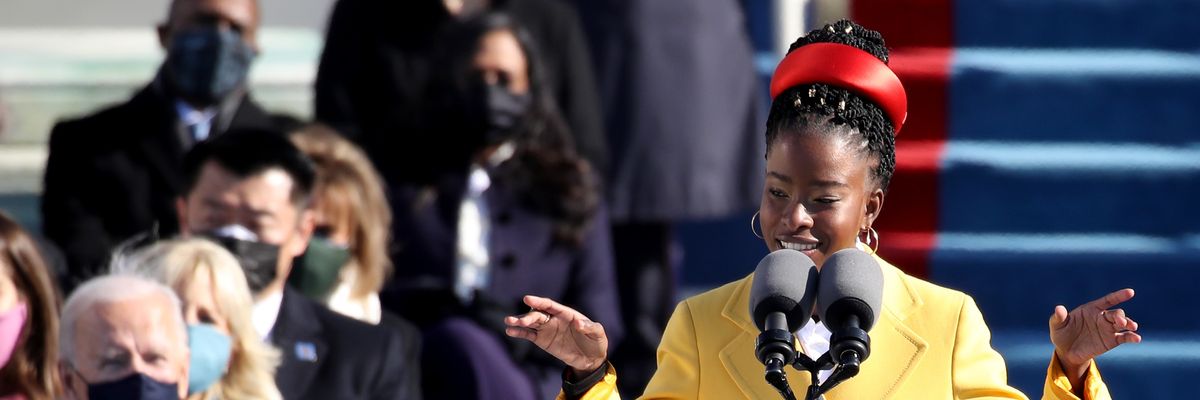Amanda Gorman, the first-ever National Youth Poet Laureate, reacted Tuesday after a South Florida school banned elementary students from reading the poem she recited at President Joe Biden's 2021 inauguration following the complaint of a parent who has repeatedly espoused white supremacist and anti-Jewish views.
"I'm gutted," Gorman said in a statement posted on Twitter. "Because of one parent's complaint, my inaugural poem, The Hill We Climb, has been banned from an elementary school in Miami-Dade County, Florida."
"Book bans aren't new," she continued, "but they have been on the rise—according to the [American Library Association], 40% more books were challenged in 2022 compared to 2021."
"The majority of these censored works are by queer and non-white voices."
Common Dreamsreported last month that laws passed in Republican-controlled states have led to nearly 1,500 book bans nationwide during just the first half of the 2022-23 school year. This followed a record number of book bans last year, according to the American Library Association.
"What's more, often all it takes to remove these works from our libraries and schools is a single objection," Gorman added. "And let's be clear: Most of the forbidden works are by authors who have struggled for generations to get on bookshelves. The majority of these censored works are by queer and nonwhite voices."
While Gorman's poem can still be read by sixth, seventh, and eighth-graders at Bob Graham Education Center in Miami Lakes, students in grades K-5 are barred from reading or reciting the widely acclaimed work, which promotes unity, reflection on the past, and hope for the future of the United States.
The restriction was enacted after Daily Salinas, a mother of two students at the school, lodged a complaint challenging five works—Gorman's poem, plus The ABCs of Black History, Cuban Kids, Countries in the News Cuba, and Love to Langston—over what she claimed are references to critical race theory, "indirect hate messages," gender ideology, and indoctrination.
"One parent could get my poetry banned from classrooms. And yet one country can't ban assault rifles from massacring them," Gorman noted on Twitter.
In her complaint, Salinas—who erroneously attributed Gorman's poem to "Oprah Winfrey"—objected to pages containing two passages of The Hill We Climb.
In a Monday interview with the Miami Herald, Salinas insisted she "is not for eliminating or censoring any books," but wants materials to be age-appropriate and for students "to know the truth" about Cuba—a socialist dictatorship with a higher literacy rate than the United States.
The Herald made no mention of Salinas' ties to far-right and white supremacist groups. A Twitter thread posted Tuesday by Miami Against Fascism shows Salinas rallying with the Proud Boys, a neo-fascist group that promotes and perpetrates political violence, and Christopher Monzon, who allegedly assaulted anti-racist counterprotesters at the deadly 2017 Unite the Right rally in Charlottesville, Virginia.
Miami Against Fascism also posted video showing Salinas and members of the far-right group Moms for Liberty—a Florida-based pressure group sometimes referred to as "Klanned Karenhood" for its crusade ban books in schools across the United States—interrupting a July 2022 Miami school board meeting.
Salinas also shared social media posts promoting white supremacist and anti-Jewish conspiracy theories, including Protocols of the Elders of Zion.
The Miami Lakes school's restriction of Gorman's poem comes amid relentless attacks by Florida Gov. Ron DeSantis—who on Wednesday officially declared his candidacy for the 2024 Republican presidential nomination—and other GOP state officials on educational freedom from kindergarten through the university level.
DeSantis has replaced key state education officials with right-wing allies who toe his "anti-woke" line, and has been accused of stoking a climate of fear in which educators have removed books from classroom libraries to avoid running afoul of bans on titles dealing with race or LGBTQ+ issues.
Notable figures who rushed to defend Gorman include Miami-Dade Mayor Daniella Levine Cava, a Democrat, who invited the 25-year-old poet to recite The Hill We Climb before a public audience, and the ACLU, which tweeted: "Schools should be fostering growth and the exchange of ideas—not preventing students from learning and understanding different perspectives."
"These unnecessary book bans join a host of other attempts to silence us," the civil liberties group added. "We must fight back."
In her statement Tuesday, Gorman explained that "I wrote The Hill We Climb so that all young people could see themselves in a historical moment."
"Ever since, I've received countless letters and videos from children inspired by The Hill We Climb to write their own poems," she said. "Robbing children of the chance to find their voices in literature is a violation of their right to free thought and free speech."
"What can we do? We must speak out and have our voices heard," Gorman stressed. "That's why my publisher, Penguin Random House, joined PEN America, authors, and community members in a lawsuit in Florida's Escambia County to challenge book restrictions like these."
"Together this is a hill we won't just climb, but a hill we will conquer."
"Together this is a hill we won't just climb, but a hill we will conquer," Gorman asserted.
Gorman was referring to a lawsuit filed last week claiming Escambia County School Board book bans are unconstitutional.
"It's quite apparent what [book bans] are about: It's an effort to erase certain segments of our population, to marginalize particular stories, to prevent kids from seeing themselves in the books they find on the shelf," PEN America CEO Suzanne Nossel said during an interview on MSNBC last week.
